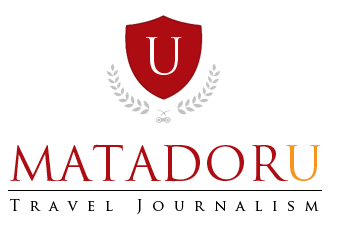Although MatadorU is not currently college-accredited, Michael has shown that students can indeed study travel journalism at the U and earn college credit — if they have an independent study program available to them and a professor who believes MatU can provide a qualified course.

I caught up with Michael shortly after his completion of our travel writing course to pick his brain on the process of earning college credit through MatadorU.
JJ: What school do you / did you attend?
ME: Seattle Pacific University.
Tell me about the program that allowed a self-directed study course such as MatadorU.
Well, I was getting my degree in English, and I needed to do some independent study for a class I’d missed. The class I was supposed to take was called Advanced Creative Nonfiction, but it was only offered once every two years. So I got in touch with my Faculty Advisor (Dr. Kimberly Segall, whom I’d traveled with to Spain and Morocco and taken a travel writing course), and pitched MatU to her as a curriculum. She really liked the course outline and the fact that it would be a good substitution for my Advanced Creative Nonfiction class, so we filled out the paperwork and dubbed my course “MatU Advanced Travel Writing.” Fancy.
What did your professor say when you asked to take the MatadorU Travel Writing course for credit?
She thought it was a good idea, especially after I’d shown her the outline. I think MatU’s curriculum gives a good backbone for an independent study course — and having that structure already built in was good for both of us. It gave me direction, and it gave her peace of mind that I wouldn’t sit around making stuff up for credit.
Had your professor heard of MatadorU or Matador Network?
No, she hadn’t. Although I think at the end of everything, she was pretty impressed.
How many credits did you earn?
I earned 3. SPU is on the quarter system.
How long did it take you to complete the course? Did you have to complete the work on the same schedule as ‘regular’ classes?
I was able to finish all of my assignments in 10 weeks, which is the length of SPU’s quarters. That being said, because it was an independent study, I wasn’t on a set schedule of turning assignments in. I think this has much more to do with the fact that my professor is a bit of a free spirit and wants to pass that along to her students. I believe we ended up meeting once in the beginning to discuss MatU as curriculum and get the paperwork done, once in the middle of the quarter, and then once at the end as well.
How did your professor verify that you did the work?
At the end of the quarter, I emailed her a Word document with every prompt and assignment in order. That Word document was basically my entire grade (gulp).
What advice can you give students that want to take a MatadorU course for college credit?
Do it. Seriously. MatU gives you so much more than tricks and tips for better writing. On top of all the connections you can make through the student community, you also learn how to be a better traveler and (believe it or not) a better person, too.
In conclusion…
For colleges and universities, MatadorU would add depth to their course selection and allow for more flexibility in humanities classes that may not be available otherwise — especially over the summertime.
Mostly, though, it would be good for the students. MatadorU teaches students that while their stories are indeed the core of their travel writing, the students themselves should not be the main focus of the writing. What is at the core is interaction on a face-to-face level. Travel is all about relationships and experiences that point to something larger than the author.
That’s a hard concept to pick up on from a university class.
